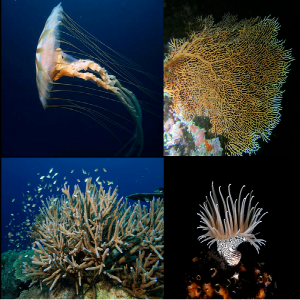Mucus secretions in Cnidarian, an ecological, adaptive and evolutive tool

Accepted: 25 January 2023
HTML: 509
All claims expressed in this article are solely those of the authors and do not necessarily represent those of their affiliated organizations, or those of the publisher, the editors and the reviewers. Any product that may be evaluated in this article or claim that may be made by its manufacturer is not guaranteed or endorsed by the publisher.
Authors
Mucus secretion provides an interface with unique and multifunctional properties between the epithelial cells of many aquatic organisms and their surrounding environment. Indeed, mucus is involved in various essential biological processes including feeding, reproduction, osmoregulation, competition for space, defense against pathogens, xenobiotics, and a multitude of environmental stressors. The ability to produce a functional mucus layer is an important evolutionary step, arising first in Cnidaria that allowed for the development of the mucus-lined digestive cavity seen in higher metazoans. Mucus secretion by cnidarians has been moderately investigated in both corals and jellyfish, which among cnidarians are the ones that have shown the highest secretion rates to date. However, although in corals the production of mucus has received more attention, especially in view of the important ecological role played in coral reefs, in medusozoans the topic is little considered. Although the mucus secreted by corals has innumerable and important immunological, nutritional, and protective responsibilities, it should be remembered that jellyfish too represent a fundamental component of marine trophic web, playing numerous and important roles that are still unclear today. What is certain is that jellyfish are characterized (especially in the era of climate change) by large fluctuations in population density, the ecological implications of which are poorly understood. However, in both cases (Medusozoans and Anthozoans) to date some aspects relating to mucous secretions seem completely obscure, such as the microbiome and its variations as a function of environmental conditions or ontogenetic development, its implications in the field of immunological ecology, the consequent energy costs and finally the role played by the mucus in evolutionary terms. This review summarizes the properties, functions, ecological implications and evolutionary importance of mucus, in cnidarians, mainly focusing its roles in corals and jellyfish. Understanding these aspects relating to the ecological and evolutionary importance played by mucus is of fundamental importance for the ecosystems functioning.
How to Cite

This work is licensed under a Creative Commons Attribution-NonCommercial 4.0 International License.
PAGEPress has chosen to apply the Creative Commons Attribution NonCommercial 4.0 International License (CC BY-NC 4.0) to all manuscripts to be published.


 https://doi.org/10.4081/aiol.2022.11054
https://doi.org/10.4081/aiol.2022.11054








